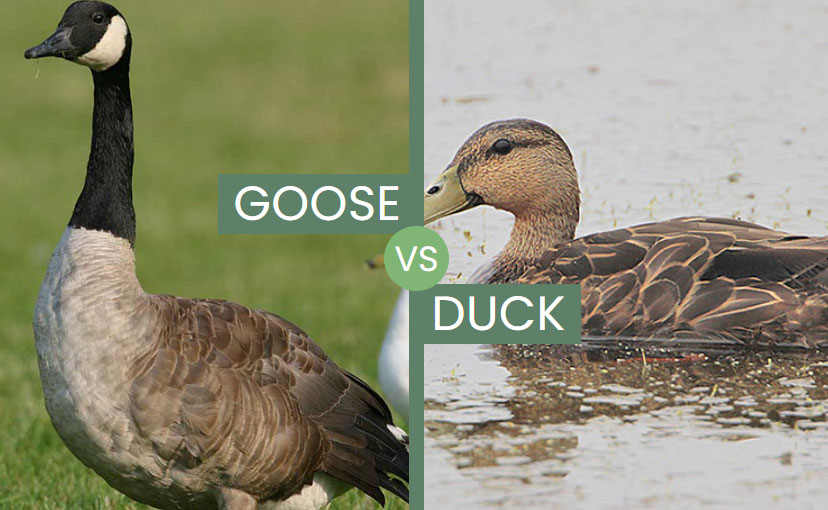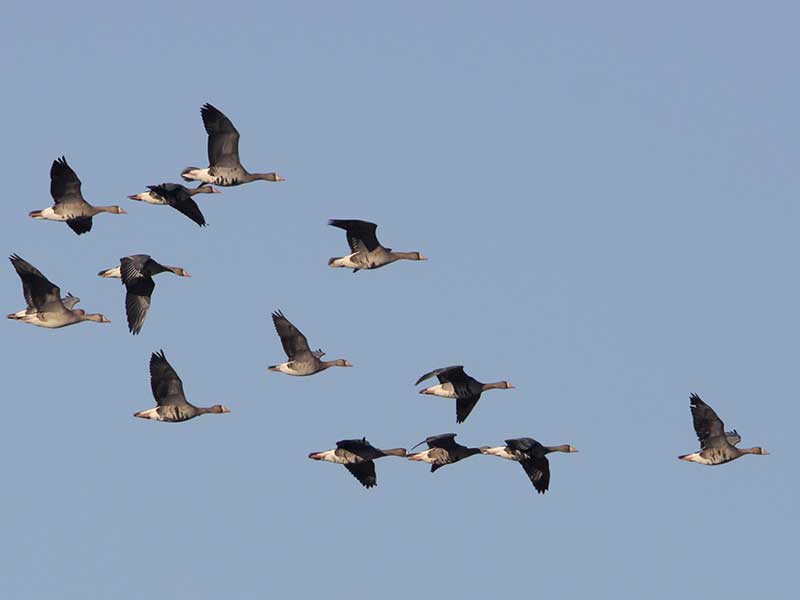Believe it or not, the main way that scientists tell the difference between geese and ducks is by how many bones they have in their necks. Geese have anywhere from 17 to 24 neck bones, while ducks have 16 or fewer bones in their necks.
Most of us can quickly tell the difference between a Muscovy Duck and a Canadian Goose, but what are the not-so-obvious similarities and differences?
In this guide, we’re going to go over everything you need to know about geese and ducks. We’ll go into detail about these birds’ size, diet, behavior, location, and more!
Body & Shape
The best indicator of whether or not you’re looking at a goose or a duck is by looking at its neck. Geese usually have much longer necks than ducks. However, we would like to mention that there’s always an exception.
For example, the Snow Goose has a noticeably shorter neck than other goose breeds. Geese can have anywhere from 17 to 24 bones in their neck, while ducks have 16 or less bones in their necks.
Both of these birds have webbed feet, are in the waterfowl family, and have feathers that are designed with specific oils that allow them to shed water instead of absorbing it.
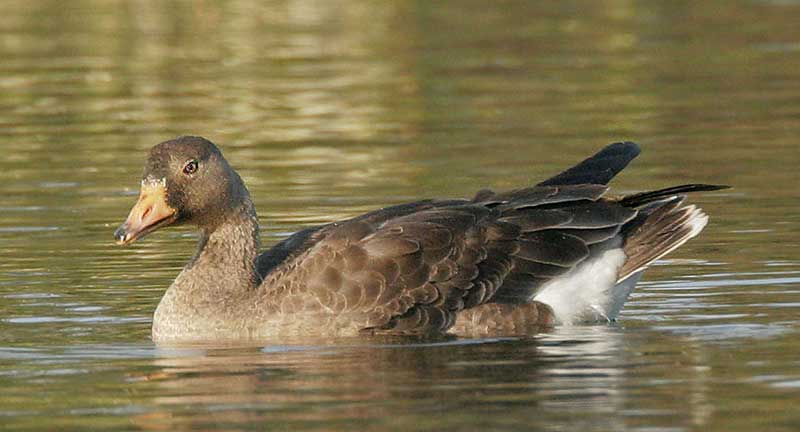
Although this bird may look like a duck, it is actually a goose – the Greater White-Fronted Goose
Ducks are medium-sized birds and have much more colorful feathers than geese. Of course, features like colorful feathers depend on specific breeds, but most ducks have intricate patterns and brightly colored feathers. Geese can be patterned but are more muted in color.
Discover more: Waterfowl Identification Guides
Geese are medium to large-sized birds. The standout features of a goose are their long necks and the absence of colors in their feathers. Also, geese have powerful wings because they cover long distances yearly when migrating. They make a V formation to increase their flying range and reduce air friction.
Ducks also have longer, broader bills than geese do. This is likely due to their dietary differences. Geese have just as strong bills, but they are significantly shorter than duck bills.
Size
The primary difference between geese and ducks is their weight and size. Geese are generally significantly bigger than ducks and have longer necks than ducks.
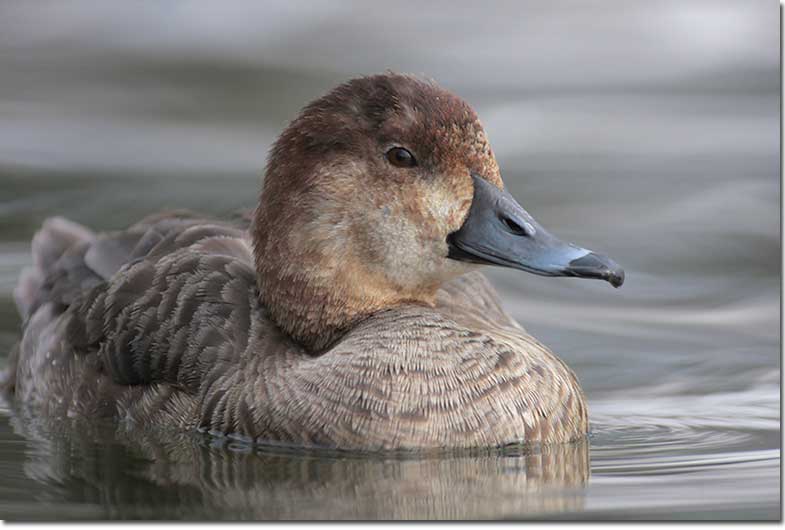
Ducks are generally much smaller than geese
Depending on the species, the average duck weighs anywhere from 3 to 6 pounds, while geese weigh twice that. Additionally, ducks can be anywhere from 15 to 20 inches in length, and geese can be anywhere from 30 to 50 inches. This is a significant difference in size.
Their size difference alone makes it easy for you to see which is a goose and which is a duck when looking at them when they’re next to each other.
Speed
On average, ducks can run 8.2 miles per hour and fly anywhere from 40 to 60 miles per hour. Geese, on the other hand, don’t run very fast.
However, they can fly 40 miles per hour, increasing to 70 miles per hour if they catch a strong tailwind. Geese and ducks have become very accustomed to humans, making them peaceful creatures most of the time.
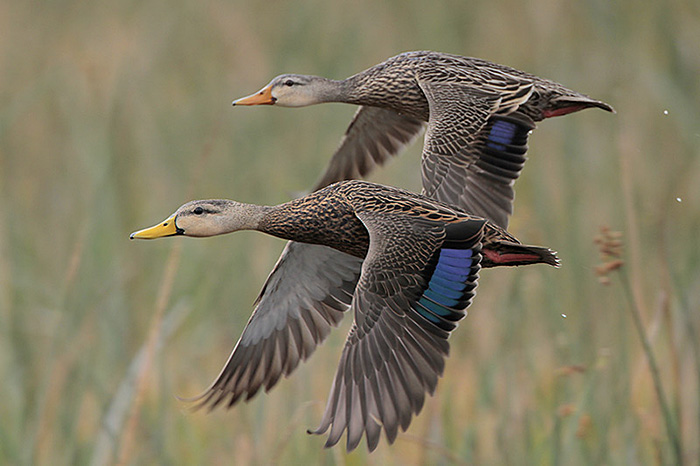
Photograph © Greg Lavaty.
There are some circumstances where they may become aggressive, especially geese. This is most common when these birds feel threatened or if it is protecting their young. While physical attacks are uncommon, they can be dangerous if they feel threatened enough.
Age
Geese appear to have more longevity than ducks; wild geese tend to live longer than wild ducks. Geese can live up to 15 to 20 years, while ducks have a lifespan of 10 to 15 years. Of course, farm-raised or pet geese and ducks can live longer than wild birds, but that’s not the only factor that comes into play.
Ducks are vulnerable birds with many natural predators, such as foxes, large fish, humans, crocodiles, and wolves. Geese have several predators skunks, raccoons, foxes, snakes, and crows prey on their eggs.
Foxes, snapping turtles, bobcats, coyotes, raccoons, and hawks prey on goslings. People, bobcats, and coyotes, prey on the adults.
Behavior
Another significant difference between geese and ducks is their behavior. Geese are known for their tendency to be aggressive, while ducks tend to have mild temperaments. In fact, domestic geese breeds are used as guard animals. A good rule of thumb is to remember that geese honk and ducks quack.
Most species of geese are migratory, and during their breeding season, males can be very territorial, making them highly aggressive when protecting their young. In addition, geese are somewhat clumsy and large birds, contributing to this instinct.
Most ducks are sedentary, so they don’t migrate. However, some duck species breed in the temperate and arctic regions of the northern hemisphere and migrate south in the winter. Ducks are social birds, apart from the breeding season, they are often seen in larger groups.
Diet
While what their diet mainly consists of depends on the specific breed of goose or duck. However, geese and ducks usually have different diets. While geese are known for their herbivore diets, ducks are omnivores.
Geese will eat vegetation growing both outside and inside of the water, while ducks eat a wide variety of crustaceans and fish. Ducks prefer to consume crustaceans and fish, but their diet can vary greatly depending on their local habitat and breed.
While ducks prefer to stick to foods like fish, both ducks and geese eat plants on land and in the water.
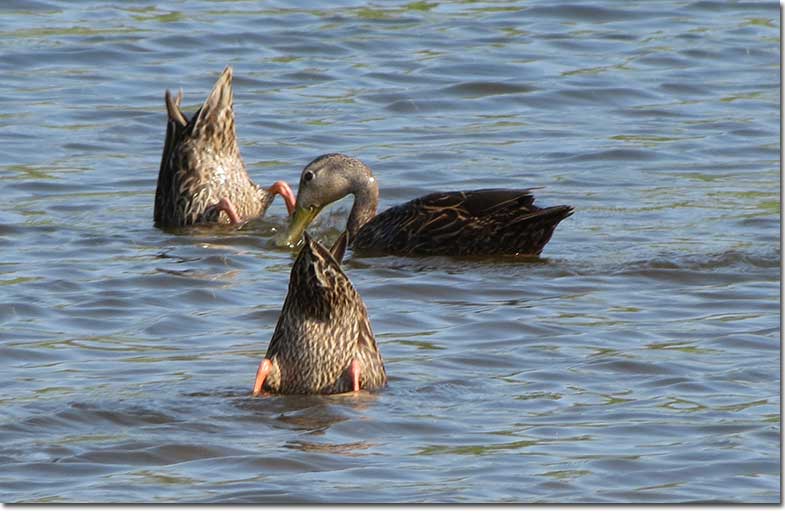
Location
Geese live in a wide variety of habitats, but one thing that remains the same is that they like to live close to water. This could be in habitats such as marshes, wetlands, lakes, and streams.
They can be found on every continent in the world except Antarctica. All geese, both wild and domesticated, are very social creatures. During the breeding season, geese can usually be found in large flocks in the habitats listed above, where they spend almost all of their time finding food.
Ducks spend almost all of their time on the water. They inhabit areas like wetlands, ponds, rivers, and streams. They can be found everywhere in the world except for Antarctica.
However, they do best in smaller-sized flocks and are known to become sad if living alone.
Nest & Eggs
The breeding season is a little different for geese and ducks. Geese are completely monogamous animals. This means they only mate with one mate during the breeding season for the rest of their lives.
However, ducks are only monogamous during the breeding season. This means once the next breeding season comes around, ducks will find a new mate. As we stated previously, geese are considered very aggressive during the breeding season. This is because the parents share the responsibility of caring for the goslings.
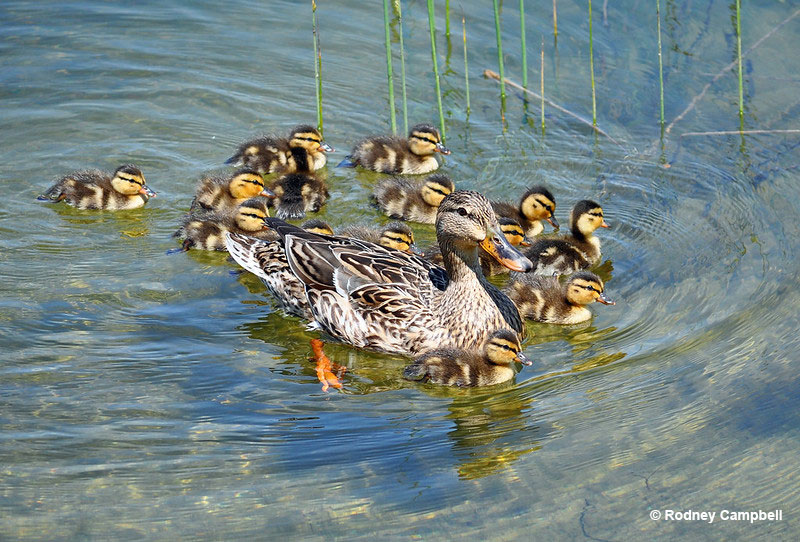
© Rodney Campbell
Since ducks are not as aggressive as geese when it comes to their young, many ducklings don’t make it and are killed by predators. Geese lay between 2 to 7 eggs, while ducks lay between 5 to 18 eggs.
Ducks and geese have an incubation period of about 28 days; unlike goslings, ducklings will imprint on the first thing they see. This is one of the reasons why we always see ducklings following the adult.
Frequently Asked Questions
Are ducks and geese related?
Yes, ducks and geese are related. These birds are part of the Anatidae family, which is a biological family of birds that includes swans, geese, and ducks.
What’s the difference between a duck and a goose?
Ducks are generally smaller than geese, have brighter colors, and are omnivores. On the other hand, geese are larger than ducks, have fewer patterns and duller colors, and are herbivores.

